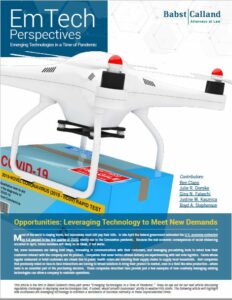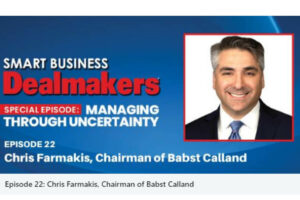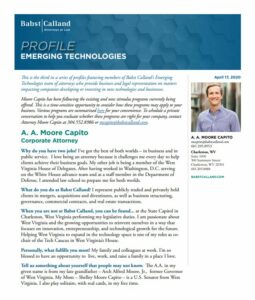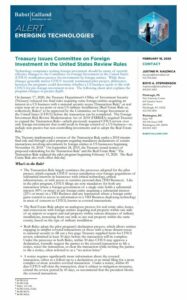“With the pandemic, our clients suddenly cared a lot about whether their contracts included a force majeure provision, what it said, what it meant and how it could be interpreted,” says Attorney Kate Cooper, shareholder at Babst Calland.
Kate Cooper spoke with Smart Business about force majeure provisions and how approaches to them are changing.
Read more.

Opportunities: Leveraging Technology to Meet New Demands
Most of the world is staying home, but businesses must still pay their bills. In late April the federal government estimated the U.S. economy contracted by 4.8 percent in the first quarter of 2020, mostly due to the Coronavirus pandemic. Because the real economic consequences of social distancing occurred in April, future numbers will likely be as bleak, if not worse.
Yet, some businesses are taking bold steps, innovating in communications with their customers, and leveraging pre-existing tools to retool how their customers interact with the company and its product. Companies that never before offered delivery are experimenting with last mile logistics. Farms whose regular restaurant or hotel customers are closed due to public health orders are retooling their supply chains to supply local households. And companies that previously relied on face-to-face interactions are turning to virtual solutions to bring their product to market, even in a field like wine production—where taste is an essential part of the purchasing decision. These companies described here provide just a few examples of how creatively leveraging existing technologies can allow a company to maintain operations.
Read More.
Tags: Commercial,
Coronavirus,
Corporate Law,
COVID-19,
Drones,
Efficiency,
Emerging,
Emerging Technology,
Industry News,
Innovation,
Last Mile Logistics,
Logistics,
Mobility,
Pandemic,
Regulations,
Regulatory,
Remote Learning,
Robotics,
Robots,
Supply Chain,
Tech Industry,
Technology,
Transportation,
US DOT

The COVID-19 crisis has revealed numerous legal issues that entrepreneurs and business leaders hadn’t faced before. Christian Farmakis, chairman of Babst Calland explains what c-suite executives should be thinking about, including giving a new level of scrutiny to contracts.
Click here to listen.
There is global consensus that large companies across various sectors need to innovate, be agile and anticipate new technologies, new markets and new demand cycles to stay competitive.
“We are seeing a paradigmatic shift among large companies,” says Justine M. Kasznica, a shareholder at Babst Calland. “Not only are these companies seeking to attract a diverse and innovative workforce, they are pursuing business-optimizing innovation and solutions, which are often found outside their walls.”
Smart Business spoke with Kasznica about how established companies are finding and taking control of technologies that set them up for a bright future.
Read More.
 This is the third in a series of profiles featuring members of Babst Calland’s Emerging Technologies team of attorneys who provide business and legal representation on matters impacting companies developing or investing in new technologies and businesses.
This is the third in a series of profiles featuring members of Babst Calland’s Emerging Technologies team of attorneys who provide business and legal representation on matters impacting companies developing or investing in new technologies and businesses.
Moore Capito has been following the existing and new stimulus programs currently being offered. This is a time-sensitive opportunity to consider how these programs may apply to your business. Various programs are summarized here for your convenience. To schedule a private conversation to help you evaluate whether these programs are right for your company, contact Attorney Moore Capito at 304.552.8986 or mcapito@babstcalland.com.
Read More.
 On January 17, 2020, the Treasury Department’s Office of Investment Security (Treasury) released two final rules requiring some foreign entities acquiring an interest in a US business with a national security nexus (Transaction Rule)[1] or real estate near air or sea ports or near US military installations (Real Estate Rule or, collectively, Rules)[2] to be approved by the Committee on Foreign Investment in the United States (CFIUS) before the transaction can be completed. The Foreign Investment Risk Review Modernization Act of 2018 (FIRRMA) required Treasury to expand the Transaction Rule—which previously required CFIUS review over only foreign investments that could result in foreign control of a US business—to include non-passive but non-controlling investments and to adopt the Real Estate Rule.[3]
On January 17, 2020, the Treasury Department’s Office of Investment Security (Treasury) released two final rules requiring some foreign entities acquiring an interest in a US business with a national security nexus (Transaction Rule)[1] or real estate near air or sea ports or near US military installations (Real Estate Rule or, collectively, Rules)[2] to be approved by the Committee on Foreign Investment in the United States (CFIUS) before the transaction can be completed. The Foreign Investment Risk Review Modernization Act of 2018 (FIRRMA) required Treasury to expand the Transaction Rule—which previously required CFIUS review over only foreign investments that could result in foreign control of a US business—to include non-passive but non-controlling investments and to adopt the Real Estate Rule.[3]
The Treasury implemented a version of the Transaction Rule under a 2018 interim final rule and through a pilot program requiring mandatory declarations of certain transactions involving investments by foreign entities in US businesses beginning November 10, 2018.[4] On September 24, 2019, the Treasury issued notices of proposed rulemaking for the Transaction Rule[5] and the Real Estate Rule.[6] The Transaction Rule replaced the pilot program beginning February 13, 2020. The Real Estate Rule also took effect that day.
Read More.
Artificial intelligence (AI) is adding efficiencies and transforming businesses everywhere, and legal practices are no exception.
General counsels who are hiring lawyers need to understand that this technology is available now, so they can make sure their lawyers are leveraging the latest technology tools. AI can increase speed, increase efficiency and lower costs for clients—if the law firm has the right tools, but more importantly knows how to use those tools.
The following are some of the common questions about advancement of AI technology in the legal space.
Read More.
 Babst Calland and our technology affiliate, Solvaire, have been performing complex due diligence, discovery, and document management projects for clients for more than 20 years. Our clients look to us for due diligence guidance in the areas of acquisitions and divestitures, as well as complex corporate, commercial and real estate transactions.
Babst Calland and our technology affiliate, Solvaire, have been performing complex due diligence, discovery, and document management projects for clients for more than 20 years. Our clients look to us for due diligence guidance in the areas of acquisitions and divestitures, as well as complex corporate, commercial and real estate transactions.
The firm has a long history of utilizing the latest technologies to enhance contract review. And, in the last few years, the firm has taken a deep look at AI-assisted review and its ability to enhance efficiency and reduce cost for clients. Saying that we have become “AI Believers” in the process is an understatement. After many AI tool evaluations, trials, and getting numerous AI projects under our belts, we have become our clients’ go-to resource in leveraging AI for their benefit.
Read More.



